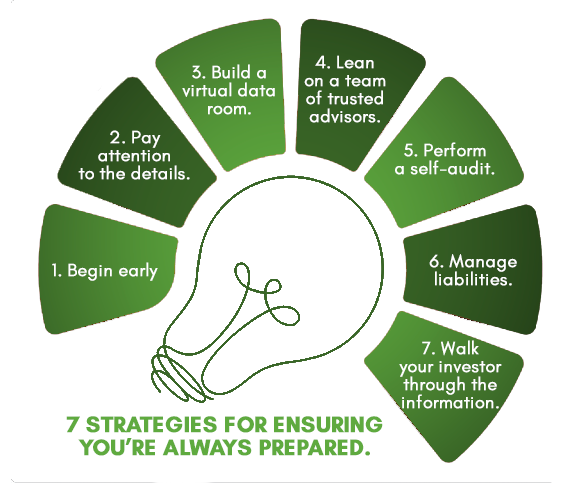There is more scrutiny of startups than ever. You must be able to track all your business transactions including receivables, payments, contract and the like. Interestingly, research suggest that nearly 80 percent of startups fail to progress beyond seed funding. An easy tactic to help your company survive that scrutiny is to your due diligence always up-to-date and always at your fingertips.
Good preparation is even more important when internal or external forces necessitate the need for a sudden infusion of capital.

Here are 7 strategies for ensuring you’re always prepared
Don’t wait until you need an investor or are planning for retirement to get your affairs ready for due diligence. Maintaining a tidy financial house should be your goal from the very beginning. Maintain an orderly system for fathering and organizing all important data, and then send it all to your accountant and lawyer on a regular basis.
Make sure all of your contracts are signed and dated, that all contractors have assigned the intellectual property rights of their creations to you, and that your business formation documents are consistent. You don’t want to chase someone down years or decades down the road. Make sure everything is as it should be today.
Your internal filing system helps you keep your documents together for daily operations, but you’ll have to upgrade to something better when it’s time for due diligence. Advanced programs should allow you to track document views, index paperwork, and assign specific permissions to different users.
You can’t do it all yourself. You need to hire and work with a team of lawyers, accountants, and other experts who know the process of due diligence inside and out. Level the playing field with the other side by building a team of experts.
Sell-side due diligence allows you to uncover and correct problems before they have the potential to affect a sale. Ask your team to ruthlessly comb through your finances and alert you to any and all issues they uncover.
You might not want to think about people who want to sue you or any areas of legal exposure. However, addressing them at the outset reduces the chances that they later come back to haunt you. Be honest about unresolved areas of exposure. If possible, address them before you get to due diligence. Settling a lawsuit now is often better than fighting about it later.
You need to facilitate due diligence. Help the investor or buyer understand what they are seeing. This allows you to set the tone of due diligence and promptly address any missing data. It also facilitates trust that improves your credibility and may improve the end value of your company.
1. Begin early
Make sure all of your contracts are signed and dated, that all contractors have assigned the intellectual property rights of their creations to you, and that your business formation documents are consistent. You don’t want to chase someone down years or decades down the road. Make sure everything is as it should be today.
2. Pay attention to the details
Make sure all of your contracts are signed and dated, that all contractors have assigned the intellectual property rights of their creations to you, and that your business formation documents are consistent. You don’t want to chase someone down years or decades down the road. Make sure everything is as it should be today.
3. Pay attention to the details
Your internal filing system helps you keep your documents together for daily operations, but you’ll have to upgrade to something better when it’s time for due diligence. Advanced programs should allow you to track document views, index paperwork, and assign specific permissions to different users.
4. Pay attention to the details
You can’t do it all yourself. You need to hire and work with a team of lawyers, accountants, and other experts who know the process of due diligence inside and out. Level the playing field with the other side by building a team of experts.
5. Pay attention to the details
Sell-side due diligence allows you to uncover and correct problems before they have the potential to affect a sale. Ask your team to ruthlessly comb through your finances and alert you to any and all issues they uncover.
6. Pay attention to the details
You might not want to think about people who want to sue you or any areas of legal exposure. However, addressing them at the outset reduces the chances that they later come back to haunt you. Be honest about unresolved areas of exposure. If possible, address them before you get to due diligence. Settling a lawsuit now is often better than fighting about it later.
7. Pay attention to the details
You need to facilitate due diligence. Help the investor or buyer understand what they are seeing. This allows you to set the tone of due diligence and promptly address any missing data. It also facilitates trust that improves your credibility and may improve the end value of your company
-By S. Chidambaram




